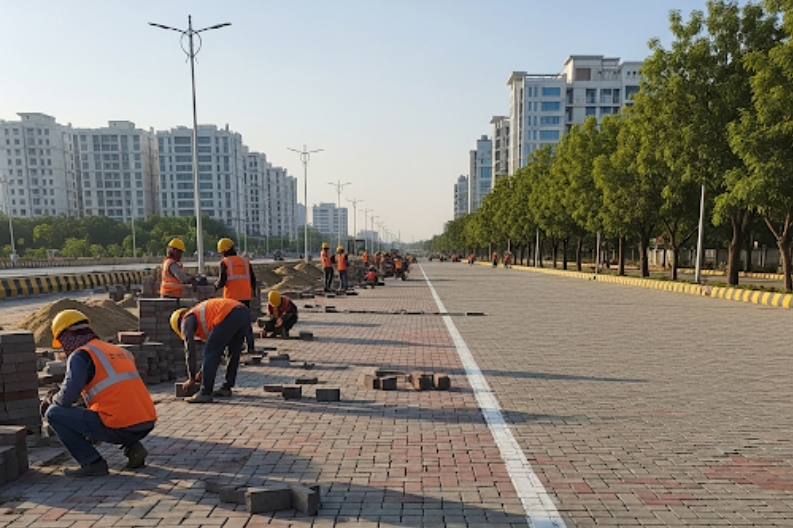Government
Haryana CM Announces New Paver Block Roads in Panchkula
Improving Roads in Panchkula
On Monday, Haryana’s Chief Minister, Nayab Singh Saini, made an important announcement.

Improving Roads in Panchkula
On Monday, Haryana CM Announces New Paver Block Roads as Chief Minister Nayab Singh Saini ordered the construction of new roads in Panchkula district. These roads will replace the old, dusty “kutcha” roads and benefit 19 villages in the hilly areas of Morni and Kalka.
Panchkula is about 20 kilometers from Chandigarh. This makes it an important link between Haryana and Punjab. The new roads will help make travel easier for many people living in the region.
Details of the Road Projects
The Chief Minister has directed that a total of 61 kilometers of roads be paved. Each of these roads will be 12 feet wide. This width will help ensure smooth traffic flow for both locals and visitors.
- The road upgrades include:
- Panipat-Safidon (41 km)
- Safidon-Jind (21.65 km)
- Saha Chowk-Panchkula-Yamunanagar (four-lane road)
- Saha Chowk-Kalpi
- Tohana-Ratia
These upgrades will not only make travel easier but also improve safety for everyone using the roads.
Additional Road Projects
Beyond the 61 kilometers of paver block roads, Saini has asked officials to speed up work on several more road projects in Panchkula. These include:
- Thapali Badisher-Koti (1.68 km)
- Pinjore Mallah-Mangniwala (1.20 km)
- Gobindpur-Thathar (5.35 km)
These projects aim to enhance connectivity in Panchkula and support the growing population.
Next Steps for the Construction
During a review meeting with officials from the public works and forest departments, Saini emphasized the need for timely action. He instructed that work should begin quickly after obtaining a no-objection certificate (NoC) from the forest department. This certificate is necessary for construction in areas with trees and wildlife.
Principal Secretary to the Chief Minister, Arun Gupta, and Additional Chief Secretary (PWD), Anurag Agarwal, were present at the meeting. They discussed strategies to ensure that the projects are completed efficiently and on time.
Background on Panchkula
Panchkula is not just another town. It is part of the larger region around Chandigarh, which is known to be one of the cleanest cities in India. Cleaner cities often produce better living conditions and infrastructure for nearby areas, like Panchkula. The development of new roads will help improve civic services and support the needs of residents.
The Impact of Better Roads
Better roads mean more than just smoother driving. They connect communities, help businesses grow, and make it easier for people to access education and healthcare. For the hilly areas of Morni and Kalka, these roads will make it easier for residents to travel to nearby towns and cities.
Local farmers can transport their goods more easily. This can lead to increased sales and better incomes. Students will also find it easier to reach schools and colleges. Parents will have less worry about how their children get to school.
The Future of Infrastructure in Haryana
The move to replace kutcha roads with paver blocks is part of a larger plan. The Haryana government is focusing on improving rural infrastructure. This effort aims to boost the local economy and improve the quality of life for people living in these areas.
As more projects like this are developed, the future looks bright for the communities in Haryana. Residents can look forward to better roads, stronger connections, and improved services.
Conclusion
In conclusion, Haryana CM Announces New Paver Block Roads, marking a positive step for Panchkula. The construction of 61 kilometers of new paver block roads will greatly benefit the region. With prompt action and good planning, these improvements will help transform the lives of many people living in the hilly areas of Morni and Kalka.
Government
Strict Firecracker Rules in Mohali for Upcoming Festivals
The Mohali district in Punjab is taking strong steps to control firecracker usage during festivals.

Strict firecracker rules in Mohali for upcoming festivals aim to protect public health and improve air quality during the festive season. The Mohali district administration in Punjab has taken strong steps to reduce pollution caused by fireworks. These measures will apply to popular celebrations such as Diwali, Guru Nanak Dev Ji’s Parkash Purab, Christmas, and New Year’s Eve to ensure safer and cleaner festivities for everyone.
The administration introduced these restrictions under Section 163 of the BNNS, directly banning the sale, use, and storage of traditional firecrackers. However, officials have allowed people to burst approved crackers only during specific hours.
Here are the permitted timings:
- Diwali: 8 PM to 10 PM
- Guru Nanak Dev Ji’s Parkash Purab (November 5): 4 AM to 5 AM and 9 PM to 10 PM
- Christmas (December 25-26): 11:55 PM to 12:30 AM
- New Year’s Eve (December 31, 2025 – January 1, 2026): 11:55 PM to 12:30 AM
District Magistrate Komal Mittal explained that Punjab has completely banned series or chain fireworks, also known as laris. These types of crackers release excessive smoke and noise, which seriously affect air quality and public health. Therefore, only green crackers, which are safer and less polluting, will be permitted.
Green crackers do not contain harmful elements like barium salts, mercury, antimony, or lead. They release fewer toxic gases and create lower noise levels. Moreover, only licensed sellers can trade these eco-friendly crackers. The administration believes this decision will encourage people to celebrate responsibly and help protect the environment at the same time.
To prevent illegal online sales, major e-commerce websites such as Amazon and Flipkart are strictly prohibited from accepting firecracker orders in Mohali. Authorities are continuously monitoring online activities to ensure full compliance with this order.
Meanwhile, the local police and the Pollution Control Department will jointly enforce these restrictions. They will actively check marketplaces and residential areas to stop violations. In addition, the Punjab Pollution Control Board (PPCB) will monitor air quality in different cities and towns. The PPCB will work according to the Central Pollution Control Board (CPCB) guidelines and pay special attention to non-attainment cities, where air quality consistently fails to meet government standards.
Officials pointed out that these restrictions fully align with the rulings of the Supreme Court of India and the National Green Tribunal (NGT). Because of this legal backing, the move carries both administrative and judicial support. It also reinforces the government’s ongoing mission to protect citizens’ health while maintaining environmental balance.
Anyone who violates these firecracker rules will face strict consequences. Offenders can be fined or even jailed under Section 15 of the Environment (Protection) Act, 1986, along with penalties under other environmental laws. The prohibitory orders will remain in effect from October 1, 2025, to January 2, 2026, covering the main festive period.
Environmental experts and health officials have welcomed this decision. They explained that during Diwali and winter, Punjab often experiences a sharp increase in air pollution due to smoke from fireworks and stubble burning. Therefore, these restrictions will likely help reduce harmful gases and dust particles in the atmosphere. Moreover, schools, NGOs, and local communities are promoting awareness campaigns about celebrating festivals with fewer crackers and more sustainable practices.
Ultimately, strict firecracker rules in Mohali for upcoming festivals reflect the Punjab government’s firm commitment to cleaner air and safer celebrations. With collective cooperation from citizens. These measures can create pollution-free festivities, protect public health, and ensure a healthier environment for future generations.
Government
Haryana Launches an Important Plan for a Greener Future
In a significant step towards protecting the environment, Haryana’s Chief Minister Nayab Singh Saini announced the State Environment Plan (SEP) 2025-26 on Tuesday.

In a significant move for sustainability, Haryana launches an important plan with the introduction of the State Environment Plan (SEP) 2025-26. Announced on Tuesday by Chief Minister Nayab Singh Saini in Panchkula, this initiative aims to make Haryana a leader in environmental protection and future-ready development. The plan focuses on achieving Sustainable Development Goals (SDGs) with clear targets to improve living conditions across the state.
The SEP is more than just a framework. It includes a detailed study of Haryana’s environmental condition. The focus areas are agriculture, waste management, transport, industry, and pollution control.
The State Pollution Control Board worked with the Indian Green Service Development (IGSD) and the Energy and Resources Institute (TERI) to draft this plan. A key highlight is the report A Dual Strategy Sprint Towards Sustainability. It calls for reducing both carbon dioxide emissions and short-lived climate pollutants. This approach will improve air quality and aligns with regional efforts in Punjab.
Waste management forms another crucial part of the SEP. It introduces 13 Integrated Solid Waste Management Plants to tackle growing urban challenges in cities like Mohali and Chandigarh. The plan also emphasizes improving water and air quality, which are vital for public health and well-being.
Officials noted that every component of the SEP will help Haryana use resources wisely while promoting long-term sustainability. The initiative shows the state’s proactive stance against pressing issues such as pollution, waste, and resource depletion.
The timing of this plan is vital. Global awareness of environmental challenges is growing quickly. By using innovative solutions and involving both institutions and citizens, Haryana aims to become a model state for eco-friendly growth.
Chief Minister Saini’s vision for a greener Haryana is clear in this bold step. The SEP seeks to protect resources and inspire communities to adopt sustainable practices.
In conclusion, Haryana launches an important plan that acts as a blueprint for future growth rooted in environmental responsibility. With strong policies, organizational support, and citizen involvement, the state is paving the way for a healthier tomorrow.
Government
Punjab CM Urges Centre to Use Chenab River Water
Punjab CM’s Call for Chenab River Water Usage
On August 5, 2025, Punjab’s Chief Minister Bhagwant Mann met with Union Jal Shakti Minister C R Patil in Delhi. Mann requested the Centre to u

Punjab CM urges centre to consider using water from the Chenab River during a meeting with Union Jal Shakti Minister C R Patil in Delhi on August 5, 2025. Chief Minister Bhagwant Mann highlighted that tapping into this source could help resolve the long-standing water-sharing dispute with Haryana while also pressing for the cancellation of the Sutlej Yamuna Link (SYL) canal project.
The proposal comes after the suspension of the Indus Water Treaty with Pakistan, which has opened up opportunities for India to utilize Chenab water. Mann suggested diverting this water to dams like Ranjit Sagar, Pong, and Bhakra, with new canals built in Punjab to first meet local needs before supplying Haryana and Rajasthan.
He explained that using Chenab water would significantly reduce Punjab’s dependence on groundwater. With surface irrigation revived, farmers could benefit directly. Currently, Punjab requires 52 million acre-feet (MAF) of water but has access to only 26.75 MAF, split between 12.46 MAF from surface water and 14.29 MAF from groundwater. The Chenab diversion, Mann argued, could provide major relief to Punjab’s agriculture sector.
Mann also pushed for shelving the SYL canal in favor of alternative projects. He proposed transferring surplus Sharda River water to the Yamuna and diverting Chenab water to the Beas through the Rohtang tunnel. This approach, according to him, would secure Haryana’s needs without burdening Punjab’s already scarce resources.
Additionally, Mann insisted on revisiting the May 1994 water-sharing memorandum. He emphasized that Punjab deserves 60 percent of Yamuna’s surplus water, especially since Haryana already benefits from multiple local rivers and tributaries such as the Ghaggar, Tangri, Markanda, Saraswati, and others.
In conclusion, Punjab CM urges centre to adopt Chenab River water as a long-term and sustainable solution to Punjab’s water crisis. This move, he believes, will conserve groundwater, support farmers, and replace the controversial SYL project with fairer alternatives, ensuring equitable water management for both Punjab and Haryana.
-

 Entertainment3 years ago
Entertainment3 years agoTop 15 Punjabi Models – Male and Female List
-

 City Guide3 years ago
City Guide3 years ago3B2 Mohali Market Shops: Discover 44 Hidden Gems
-

 Entertainment3 years ago
Entertainment3 years agoTop 11 Punjabi Comedians of All Time
-

 Jobs4 years ago
Jobs4 years agoTop 20 IT Companies in Mohali
-

 Food4 years ago
Food4 years ago11 Best Restaurants in Mohali You Must Visit
-

 Food3 years ago
Food3 years agoTop 15 Cafes in Mohali you must visit
-

 Property2 years ago
Property2 years agoWho Lives In Homeland Mohali: Punjabi Celebrities, Business People…
-

 Education2 years ago
Education2 years ago10 Famous Punjabi Writers With A Great Impact On The Literary World
